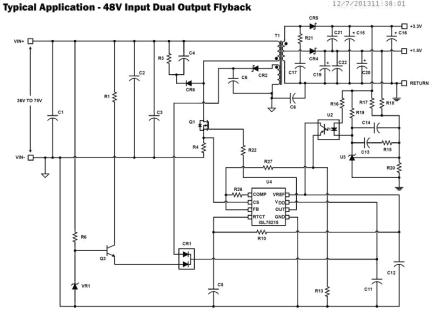Overview
Description
The ISL78215 family of adjustable frequency, low power, pulse width modulating (PWM) current mode controllers is designed for a wide range of power conversion applications including boost, flyback, and isolated output configurations. Peak current mode control effectively handles power transients and provides inherent overcurrent protection.
This advanced BiCMOS design is pin compatible with the industry standard 384x family of controllers and offers significantly improved performance. Features include low operating current, 60μA start-up current, adjustable operating frequency to 2MHz, and high peak current drive capability with 20ns rise and fall times.
The ISL78215 is tested to AEC-Q100 specifications.
Features
- 1A MOSFET Gate Driver
- 60μA Start-up Current, 100μA Maximum
- 25ns Propagation Delay Current Sense to Output
- Fast Transient Response with Peak Current Mode Control
- Adjustable Switching Frequency to 2MHz
- 20ns Rise and Fall Times with 1nF Output Load
- Trimmed Timing Capacitor Discharge Current for Accurate Deadtime/Maximum Duty Cycle Control
- High Bandwidth Error Amplifier
- Tight Tolerance Voltage Reference Over Line, Load, and Temperature
- Tight Tolerance Current Limit Threshold
- Pb-Free (RoHS Compliant)
- AEC-Q100 Tested
Comparison
Applications
- Automotive Power
- Telecom and Datacom Power
- Wireless Base Station Power
- File Server Power
- Industrial Power Systems
- PC Power Supplies
- Isolated Buck and Flyback Regulators
- Boost Regulators
Documentation
|
|
|
|
|---|---|---|
| Type | Title | Date |
| Datasheet | PDF 621 KB | |
| Product Change Notice | PDF 264 KB | |
| Product Change Notice | PDF 168 KB | |
| Application Note | PDF 509 KB | |
| Application Note | PDF 397 KB | |
5 items
|
||
Design & Development
Models
ECAD Models
Schematic symbols, PCB footprints, and 3D CAD models from SamacSys can be found by clicking on products in the Product Options table. If a symbol or model isn't available, it can be requested directly from the website.

Product Options
Applied Filters:
